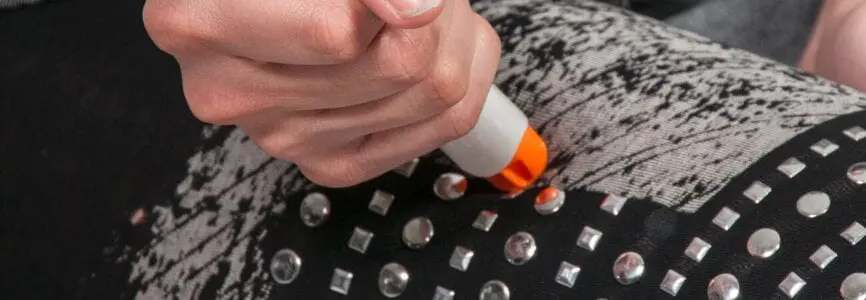Bioethics Forum Essay
EpiPen Furor: Patient Groups Take Money, Stay Mum
The furor around the price of an EpiPen has exposed the contradictions of patient advocacy groups with funding from the pharmaceutical industry. EpiPens contain epinephrine, an oldie-but-goodie, inexpensive generic drug that effectively treats potentially life-threatening allergic reactions. Pharmaceutical companies put this common, inexpensive drug into expensive, auto-injecting devices, which are useful, portable devices for those who are severely allergic to bee stings, peanuts, or other foods.
EpiPen, a Mylan-manufactured auto-injector, has cornered the market, and Mylan has been steadily raising prices. A two-pack of EpiPens, which used to cost about $100, currently runs about $600. That’s an annual expense even if the device is never used because the devices are “short-dated,” meaning they expire quickly — in this case, within 18 months. No wonder EpiPen has become a billion-dollar blockbuster product.
Relatives of people with severe allergies ignited a truly grassroots movement against the price hikes that spread like wildfire over social media, reaching the ears of politicians and creating pressure on the company, which offered to cover more patient copays. Hardly a bite in the company’s profits, as insurance companies are still paying full freight on the inflated price, but never mind that. What was really striking was the complete silence about EpiPen prices on the part of the groups trumpeting the importance of allergy awareness, including Food Allergy Research & Education (FARE) (a merger of the Food Allergy & Anaphylaxis Network and the Food Allergy Initiative), the Asthma and Allergy Foundation of America (AAFA) and the Allergy & Asthma Network. All receive substantial funding from Mylan, which lists them as “allies” in its 2015 social responsibility report, and Mylan has given more than $10 million to fund “educational efforts” since 2011. We are pretty sure those educational efforts didn’t include telling patients that a far cheaper epinephrine auto-injector – Adrenaclick – was available – or that a vial of epinephrine and a syringe could be had for about $15.
This is just the latest example of patient advocacy groups failing to speak up when Big Pharma abuses patients’ interests. Groups with funding from the pharmaceutical industry rarely, if ever, raise alarms publicly about drug side effects, high drug prices, or inadequate or biased information that the industry provides to consumers – even though these problems are well-documented and can cost lives among members of their constituencies.
Money buys silence. The groups that Mylan funds told New York Times reporter Tara Parker-Pope they have had “behind the scenes” conversations with the company to reduce out-of- pocket costs for consumers. Colluding on a corporate public relations strategy that does nothing to bring drug prices down is antithetical to consumer advocacy. Public challenges, not high-level tête-à-têtes among allies, are what’s needed.
Only a handful of patient advocacy and health advocacy groups refuse money from pharmaceutical companies and those groups, including the National Women’s Health Network, Breast Cancer Action, and Health Research Group, are the ones critiquing drugs, critiquing biased research, and speaking out about drug prices.
Unfortunately, the public can’t always suss out which groups are receiving industry funds because the groups aren’t required to declare their corporate funding sources. They should be – although transparency about funding doesn’t free a group to speak truth to power. High drug prices help make those generous “educational grants” to patients’ groups possible, and may be paying the salaries of their tongue-tied spokespeople.
In the case of the EpiPen, thankfully, angry moms on Facebook are injecting a healthy dose of outrage into the body politic.
Sharon Batt, a social science researcher in pharmaceutical policy, is an adjunct professor in bioethics and a team member with the Technoscience and Regulation Research Unit at Dalhousie University in Canada. Her book on patient group activism will be published in early 2017. Adriane Fugh-Berman is associate professor of pharmacology and physiology at Georgetown University Medical Center and director of Pharmed Out, a Georgetown project that advances evidence-based prescribing and educates health care professionals about pharmaceutical marketing practices.














The National Center for Health Research also rejects money from pharmaceutical, bio, and medical device companies, and it makes it very difficult to survive, let alone thrive. Meanwhile, the medical/health nonprofits and charities that do take industry money have the money and resources for advertising and promotional activities that enable them to grow. The rich charities and think tanks and other nonprofits get richer, as a result. I think most donors would be shocked to learn how much money pharmaceutical companies donate to their favorite charities, including cancer charities, Alzheimer’s organizations, heart disease chariies, and women’s rights organizations.
Life in a kleptocracy is difficult for people–with or without money. Ignoring the needs of poor people comes at a cost even for those with money. The Zika virus and other communicable disease pathogens easily cross social class, race, and sexual-orientation lines. The grandstanding and rhetoric of our ignorant politicians only increases preventable morbidity and mortality. Eventually there will be a vaccine against Zika. Unfortunately, there will never be one against the politicians.